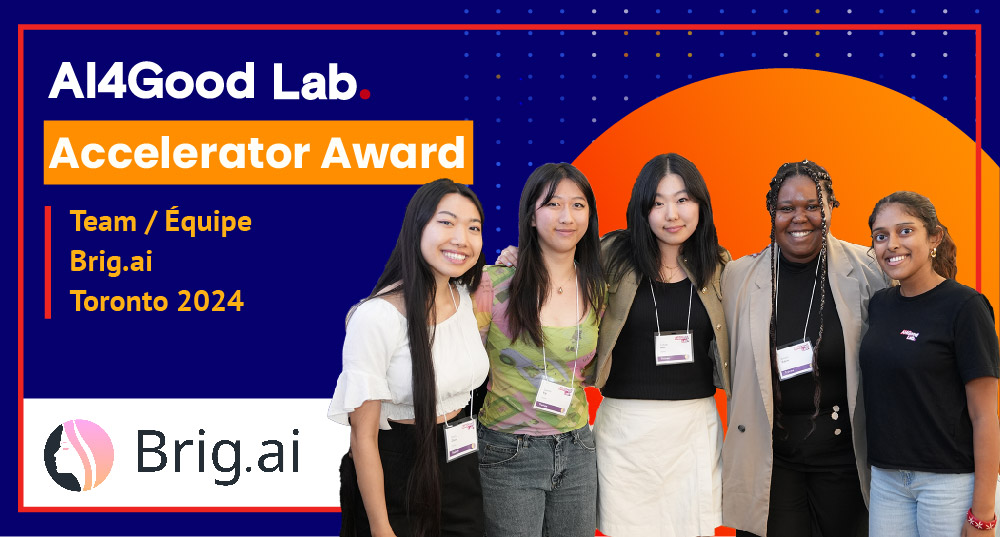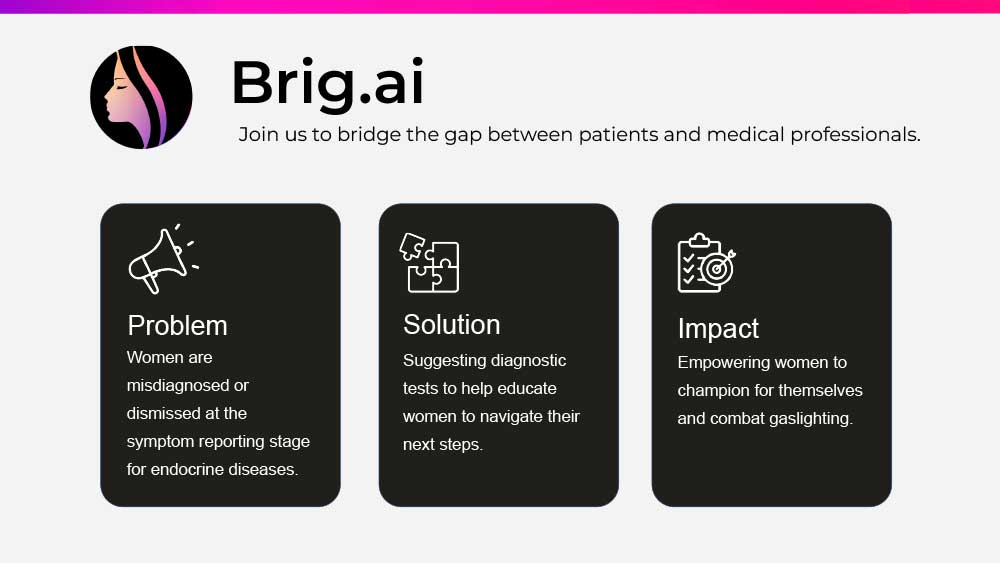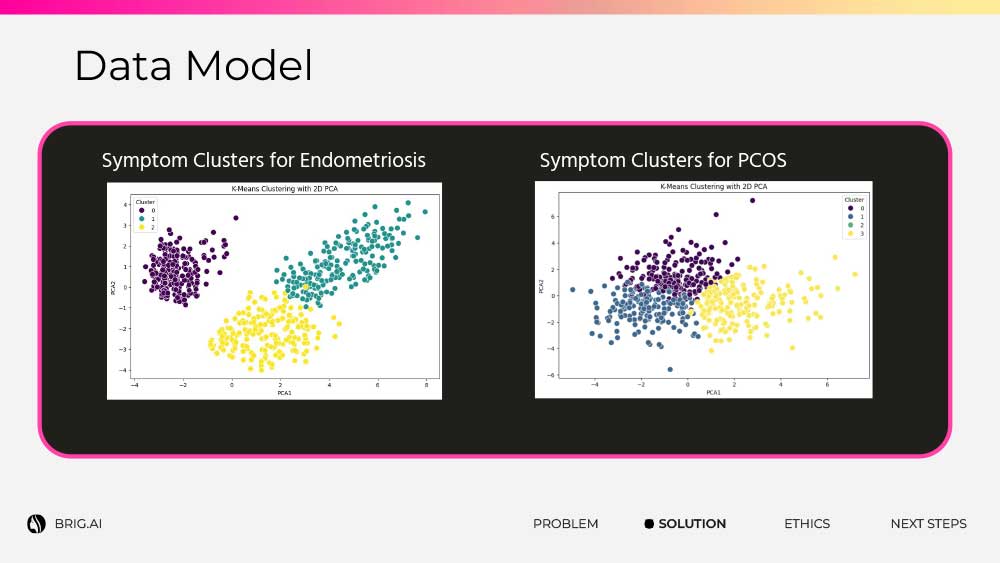
Team members
Doris Zhang, Lauren Yip, Sohee Goo, Shabicha Sureshkumar, Emem Edem
Project summary
Brig.AI is preventing diagnostic delay for Endometriosis and Polycystic ovary syndrome by informing women of their most effective diagnostic tests based on their symptoms. Brig.ai bridges the gap between medical professionals and patients.
Keywords
Endometriosis, PCOS, Medical gaslighting, Predictive model, Artificial Intelligence (AI), Patient dismissal, Women’s Reproductive Health

Inspiration
The idea for Brig.AI was born from a casual lunch conversation about periods. Several team members shared their experiences of confusion and frustration over irregular menstrual cycles and the common occurrence of medical gaslighting. We realized that many women, including ourselves, have faced significant diagnostic delays and dismissals by healthcare professionals. This project aims to empower women by helping them understand their symptoms better, facilitating more informed discussions with doctors, and providing actionable next steps after a frustrating doctor’s visit.
List of technologies
Python, K-Means Clustering, Adaboost, Logistic Regression, pandas, Scikit-Learn, NumPy, Figma, React.js, ChatGPT, Flask
Project development
Brig.AI predicts the likelihood of users having PCOS or Endometriosis based on self-reported symptoms and provides personalized recommendations for next steps, such as diagnostic tests. To build the model, we used datasets with self-reported symptoms for both conditions, refining the model by removing features that did not significantly contribute to prediction accuracy. Our model was trained using Logistic Regression and AdaBoost, achieving accuracies between 83% and 91%. We also implemented K-Means clustering to map symptoms to specific diagnostic tests, offering a more personalized experience for each user. The dataset consisted of various self-reported symptoms, which were cleaned and pre-processed to optimize the model's performance. After training, Brig.AI predicts the likelihood of either condition, then suggests actionable next steps based on the symptom profile. This makes it a strong machine learning use case due to the complexity of diagnosing PCOS and Endometriosis, where overlapping symptoms make early identification challenging. The clustering model further enhances personalization by mapping symptom patterns to specific tests.

Impact/Innovation
Brig.AI is set apart in the landscape of women’s health tools by addressing a crucial gap in support for those who have experienced medical gaslighting. While competitors like Ubie and Ovum offer health assessments, they often overlook the specific challenges faced by women seeking validation and guidance after being dismissed by healthcare providers. Brig.AI is tailored for women who may feel uncertain about their next steps, providing a compassionate and informative resource to help them navigate their symptoms and potential diagnoses.
The uniqueness of our solution lies in its focus on empowering women through data-driven insights and personalized recommendations. By leveraging machine learning to analyze self-reported symptoms, Brig.AI not only predicts the likelihood of PCOS or Endometriosis but also suggests actionable next steps, such as appropriate diagnostic tests. This approach not only enhances user confidence but also fosters a sense of agency over their health.
The potential impact of Brig.AI on its intended audience is significant. By offering reliable predictions and tailored recommendations, we aim to bridge the gap between symptom recognition and clinical diagnosis, ultimately improving healthcare outcomes for women experiencing these conditions. Additionally, the platform serves to educate users, raising awareness about PCOS and Endometriosis, which are often underdiagnosed or mismanaged.
From a socio-technical and ethical standpoint, we recognize the importance of addressing the concerns surrounding patient privacy and data security. Brig.AI does not save any sensitive health data, ensuring that users can engage with the platform without fear of compromising their personal information. However, we are aware of the potential harms associated with our solution, such as the risk of misdiagnosis or false positives/negatives. To mitigate these risks, we include clear disclaimers and provide educational resources that emphasize the importance of consulting healthcare professionals for definitive diagnoses and treatment plans.
Overall, Brig.AI stands to make a meaningful contribution to the field of women’s health by prioritizing empathy, education, and empowerment, while conscientiously navigating the ethical implications of technology in healthcare.
Challenges we ran into & how we overcame them
One of the primary challenges we encountered during the development of Brig.AI was the difficulty in sourcing relevant and accessible datasets. We found that many of the available datasets included symptoms, such as follicle count, that were difficult for users to report on their own without medical records. While many of these symptoms are critical for diagnosing PCOS and Endometriosis, collecting them in a meaningful and ethically responsible way proved complex. To address this, we shifted our focus to accessible, self-reported symptoms that users could easily provide. By ensuring that the removal of non-contributory features did not drastically reduce model accuracy, we maintained a robust prediction capability while streamlining our dataset.
Another significant challenge arose when considering the implications of misdiagnosis or false positives/negatives. This concern heightened our awareness of the importance of accuracy and reliability in our predictions. We tackled this issue by implementing rigorous validation processes, including cross-validation techniques, to ensure our model was robust across diverse symptom profiles. Moving forward, we aim to enhance our predictions by collecting more comprehensive datasets that include both self-reported and clinical symptom data, which will help improve accuracy and reliability.
Additionally, we recognized the challenge of addressing user trust and engagement. Users may feel uncertain about the tool’s recommendations, especially when they come from a non-clinical source. To counter this, we included clear disclaimers about the limitations of our predictions and emphasized the importance of consulting healthcare professionals for definitive diagnoses. This approach aims to build user confidence while clearly communicating the tool's purpose and intended use.
Overall, while we faced several obstacles in the development of Brig.AI, our proactive strategies allowed us to navigate these challenges effectively. By focusing on user-reported data, enhancing validation processes, and fostering trust through clear communication, we are positioning Brig.AI for success in supporting women navigating the complexities of PCOS and Endometriosis.
What we learned & accomplishments we’re proud of
The AI4Good Lab provided us with invaluable knowledge through lectures, inspiring speakers, mentor guidance, and an amazing network to reach out to for assistance. The training weeks were crucial in giving us the theoretical and practical skills needed to bring our project to life. We’re proud of our fully completed project and the teamwork that made it possible. We learned how to effectively take an idea from concept to execution, define our solution, and present it confidently.
What’s next for the project
Our project is complete, but we are excited to submit it to relevant contests. We have already submitted to the Summer Innovation Challenge - Virtual Accelerate, and we eagerly await the outcome.
Acknowledgements & References
Acknowledgements:
We would like to extend our gratitude to our TA, Raiyan Rahman, for generously sharing his time and knowledge with us and helping us create this project. We would also like to thank our mentor Tahniat Khan for helping us perfect our pitch with her expert business sense during our weekly meetings. Finally, we would like to thank the AI4Good Lab for bringing us together and giving us access to the education and resources needed to create our project!
Feel free to explore more about our project!
- Github
- Presentation
- Training data
- Linkedin posts